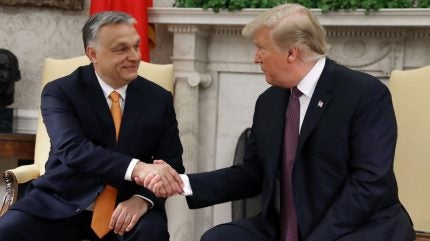
One week on from what has already been this century’s most historic election, the world is settling into a new reality. Now that Donald Trump has been elected, the question is about how big or small the distance between his campaign promises and his actual policies will be – and, who, in this new world order, will have some influence in determining the size of that gap.
For Europe, Trump’s presidency poses many worries; mainly, the threat of high import tariffs and his stance on Ukraine and Russia. Within the continent, who is best placed to communicate, effectively and productively, with the former, and next, US president?
Friends
Italian Prime Minister Giorgia Meloni’s friendliness with Elon Musk and past embrace of Trump operatives like Steve Bannon makes her a likely ally for Trump. They both have protectionist stances, anti-immigration views and strong right-wing credentials. However, recently, Meloni has also taken a more pro-Atlantic stance, recognising the importance of NATO. A member of her party has called her a “natural interlocutor” between Europe and Trump.
However, the European leader who is closest to Trump is undoubtedly Hungarian authoritarian leader Viktor Orban. Minutes after Trump announced his win, Orban wrote on X: “A much needed victory for the World!”
Trump’s win is an opportunity for Orban to bolster his standing in Europe, where he has grown isolated over dictatorship accusations, Russian ties and opposition to military aid for Ukraine. If Orban truly emerges as Europe’s main interlocutor with Trump, this isolation could decrease out of political and economic necessity for the rest of the bloc.
“Orban will see himself as a Trump-whisperer and use that to get himself more leverage within the EU,” Eurasia’s President and founder Ian Bremmer said to journalists.
How well do you really know your competitors?
Access the most comprehensive Company Profiles on the market, powered by GlobalData. Save hours of research. Gain competitive edge.

Thank you!
Your download email will arrive shortly
Not ready to buy yet? Download a free sample
We are confident about the unique quality of our Company Profiles. However, we want you to make the most beneficial decision for your business, so we offer a free sample that you can download by submitting the below form
By GlobalDataAt a recent summit in Budapest, Orban predicted that Trump would stop providing support for Ukraine in its war against Russia. He has long tried to dilute EU aid for Ukraine and called for bloc members to reconsider committing so many resources to the war.
Frenemies
Other European leaders whose views sharply contrast with Trump’s are now in an awkward position as they quickly adjust to the reality of his second term.
UK Prime Minister Keir Starmer has already butted heads with Trump, despite his best efforts during the campaign to safeguard the UK-US “special relationship” even if Trump was elected.
As has happened in the past in a form of political tradition, some Labour staffers travelled to the US to support Vice-President Kamala Harris’ campaign. Trump’s campaign called this “blatant foreign interference” and filed a legal complaint against the Labour Party.
This came after Starmer, and his Foreign Secretary David Lammy, had a two-hour dinner with Trump during their visit to New York for the UN General Assembly. As the UK tries to reignite its economy, Starmer’s actions suggest that the country cannot afford to sour relations with their biggest ally, even if Trump is at the helm.
France’s Emmanuel Macron, on the other hand, already has experience with Trump. He was the first to congratulate the President-elect on his win, saying he was “ready to work together as [they] did during four years”. Their relationship had its ups and downs but was mostly seen as cordial. It has even been characterised as a “bromance”.
Germany’s future relationship with Trump is yet to be determined, as snap elections are due to take place in February after Chancellor Olaf Scholz’ coalition fell apart last week.
Conclusion
The nature of Trump’s relationships with European leaders could be determinative for Europe as a fractured coalition seems to be facing crises on multiple fronts. There is the war in Ukraine, stagnant growth, the rise of far-right wing parties and the threat of a tariff war with the US that could lead to the dumping of more Chinese exports. Given this outlook, friends will want to get closer and those with strained relationships will be keen to repair them.



